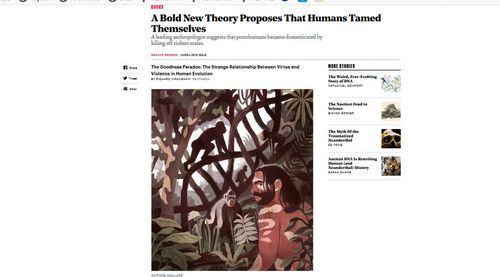
Wrangham’s "The Goodness Paradox"
02/10/2019
From The Atlantic print edition:
A Bold New Theory Proposes That Humans Tamed Themselves
A leading anthropologist suggests that protohumans became domesticated by killing off violent males.
MELVIN KONNER
MARCH 2019 ISSUEThe Goodness Paradox: The Strange Relationship Between Virtue and Violence in Human Evolution BY RICHARD WRANGHAM PANTHEON
… In fact, Wrangham’s notion of human evolution powered by self-domestication has an ancient lineage: The basic idea was first proposed by a disciple of Aristotle’s named Theophrastus and has been debated several times since the 18th century.
Unfortunately, no link is given. I find interesting early notions of more modern ideas. For example, Plato’s Republic’s opening pages offer proto-versions of Adam Smith’s division of labor idea and David Ricardo’s comparative advantage idea, but don’t develop them.
Theophrastus was a philosopher, scientist, and teacher who was Aristotle’s popular successor as head of his school. But only a few of his books have directly survived.
This latest version, too, is bound to provoke controversy, but that’s what bold theorizing is supposed to do. And Wrangham is nothing if not bold as he puts the paradox in his title to use. In his telling, the dark side of protohuman nature was enlisted in the evolution of communal harmony.
Central to his argument is the idea that cooperative killing of incurably violent individuals played a central role in our self-domestication. Much as the Russian scientists eliminated the fierce fox pups from the breeding pool, our ancestors killed men who were guilty of repeated acts of violence. Certainly all-male raiding parties have operated in some groups of humans, seeking out and killing victims in neighboring villages (which recalls the patrolling chimps that Wrangham reported on earlier in his career). The twist in his current theory is that such ambushes are turned inward, to protect the group from one of its own: They serve as a form of capital punishment. Wrangham cites a number of examples of anthropologists witnessing a group of men collaborating to kill a violent man in their midst.
Harpending and Frost suggested something similar for more recent times as well.
The idea is intriguing, and it is indeed true that human hunter-gatherers, whose societies exist without governments, sometimes collectively eliminate bad actors. But such actions are rare, as the Canadian anthropologist Richard Lee emphasized in his extensive studies of the !Kung, which include the report of an unusual case: After a certain man killed at least two people, several other men ambushed and killed him. My own two years with the !Kung point to a more robust possible selection process for winnowing out aggression: female choice. Women in most hunter-gatherer groups, as I learned in the course of my experience in the field, are closer to equality with men than are women in many other societies. Evolutionary logic suggests that young women and their parents, in choosing less violent mates through the generations, could provide steady selection pressure toward lower reactive aggression — steadier pressure than infrequent dramas of capital punishment could.
